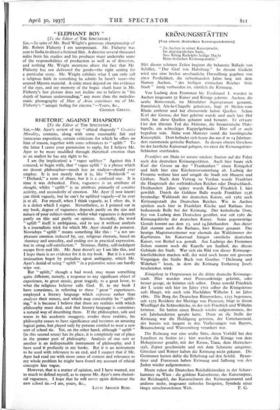RHETORIC AGAINST RHAPSODY
[To the Editor of THE SPECTATOR.] SIR,—Mr. Ayer's review of my " ethical rhapsody " Creative Morality, contains, along with some reasonably fair and innocuous exposition, certain criticisms for which he offers no hint of reason, together with some references to " uplift." To the latter I crave your permission to reply, for I believe Mr. Ayer to be more muddled through ,rhetorical emotion than as an analyst he has any right to be. I am (by implication) a " vague uplifter." Against this I contend, to begin with, that " vague uplift " is a phrase which no decent philosopher—much less an analyst—should ever employ. It is not merely that it is, like " Bolshevik " or " Diehard," a term of abuse, but it is a confused one. It is time it was debunked. First, vagueness is an attribute of thought, whilst " uplift " is an attribute primarily of conative activity, and secondarily of emotion. Mr. Ayer (I now know) Can think vaguely, but he can't be uplifted vaguely—if he ever is at all. For myself, when I think vaguely, as I often do, it is a defect which I regret. Nevertheless, as I pointed out in my book, degree of vagueness depends partly on the size and nature of your subject-matter, whilst what vagueness is depends partly on this and partly on opinion. Secondly, the word " uplift " itself is ambiguous, and to use it without analysis ls a journalistic trick for which Mr. Ayer should do penance. Nowadays "uplift " means something like this : " a not un- pleasant emotion induced by, say, religious rhetoric, based on phantasy and unreality, and ending not in practical expression, but in smug self-satisfaction." Noxious, flabby, self-indulgent escape from real life. - Mr. Ayer doesn't say I am like this, and I hope there is no evidence for it in my book. But it is a nasty insinuation begot by prejudice upon ambiguity, which Mr. Ayer's denial of using " uplift " in a pejorative sense can hardly wipe out. But " uplift," though a bad word, may mean something quite different, namely, a response to any significant object of experience, to great music, great tragedy, to a great lover, to what the religious believer calls God. If, in my book I have sometimes, in referring to these " great " experiences, employed a literary language which expresses rather than analyses their nature, and which may conceivably be " uplift- ing," it is because I believe that these are realities with which philosophy must deal, and that literary language is sometimes a natural way of describing them. If the philosopher, safe and warm in his academic snuggery, evades these realities, his philosophy ceases to have significance and becomes an amusing logical game, but played only by persons entitled to wear a new sort of school tie. Yet, on the other hand, although " uplift " (in this second sense) has its place, it is completely out of place in the greater part of philosophy. Analysis of one sort or another is an indispensable instrument of philosophy, • and I have used it profusely in my books: But it is an instrument to be used with relevance to an end, and I suspect that if Mr. Ayer had read me with more sense of context and relevance to my whole problein he might have found my account of ethical concepts lesi vague.
However, that is a matter of opinion, and I have wanted, not so much to defend myself, as to expose Mr. Ayer's own rhetori- cal vagueness. I hope that he will never again dishonour the new school tie.—I am, yours, &c.,
LOUIS ARNAUD REID.


































































 Previous page
Previous page